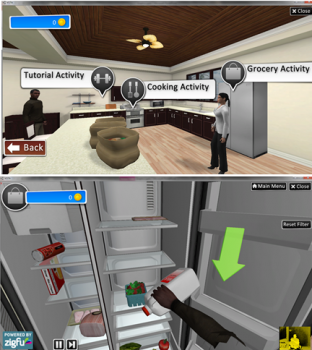The Virtual Occupational Therapy Application™ (VOTA™) is a virtual worlds-based game in which stroke patients re-learn activities of daily living (ADLs). It leverages advances in low-cost human motion tracking and commercial gaming engine software to provide a cost-effective rehabilitation option for the approximately three quarters of a million individuals in the United States affected by stroke each year. Current evidence-based stroke rehabilitation practice is based on the principle of brain plasticity – the formation of new circuits and changes to internal structures that remap existing synapses to perform functions previously accomplished by injured brain tissue. Plasticity may strengthen redundant pathways to restore lost functionality, effectively remodeling the lesioned brain. This process requires that the affected neurological pathways be exercised through intensive, repetitive, task-directed therapy that involves the stroke-impacted functions.
VOTA® is a novel therapeutic tool for upper extremity (UE) rehabilitation following a stroke. The use of VOTA® in a rehabilitation program promises to improve outcomes through post-stroke practice of activities of daily living (ADLs) within a virtual world-based gaming environment that incorporates both physical and cognitive challenges. VOTA® provides clinicians with tools to prescribe motor and cognitive difficulty levels and monitor progress through valid metrics. Built on a scalable, extensible architecture using state-of-the-art game engine technology, VOTA® is designed to be low-cost and compatible with use both within health care facilities and in patients’ homes. Hardware requirements are simply a personal computer, a video monitor, and a Microsoft Kinect sensor.
The completed VOTA® prototype system includes two ADL activities centered on the kitchen – preparing a simple meal and putting away groceries. In ongoing work, these are being expanded to include 12 integrated activities that take plan in/around the house and the community, with scalable motor and cognitive challenge levels.
The VOTA™ game runs on a standard Windows personal computer, with a Kinect™ sensor connected through a standard Universal Serial Bus (USB) port. The system is thus both low-cost and highly portable. It will be employed for occupational therapy as part of in-patient, skilled nursing, outpatient, and home health treatment programs. Initial patient exposure to the system may be in an in-patient, skilled nursing, outpatient, or home health settings.
Important innovations in VOTA™ that distinguish it from other games for therapy are: (1) the specificity of training for relearning of activities that are critical to regaining functional independence after a stroke; and (2) generation of metrics from the integrated motion tracking system, allowing therapists to quantify and track physical and cognitive improvements.
Development has been supported by the National Institutes of Health (NIH) National Institute of Child Health and Human Development.
In 2013, VOTA® was recognized with the coveted Brandon Hall Group Silver Award for Excellence in the Best Use of Games for Learning. More information on this award is available here.
In a completed pilot study conducted in partnership with the University of Virginia (UVa) and the UVa HealthSouth Rehabilitation Hospital, 14 hemiparetic stroke patients employed a prototype VOTA® system in four one-hour sessions. Outcomes include:
- First time a metric derived during performance of ADLs in a virtual world has been shown to correlate to an established UE motor assessment
- Participants had highly favorable opinions of their experience with the VOTA system and accepted the virtual world-based technology for virtual practice of ADLs
NIH-sponsored randomized, controlled efficacy trials with full-featured VOTA system to occur in early 2016.
References
Adams, R.J., Lichter, M.D., Krepkovich, E.T., Ellington, A., White, M., and Diamond, P.T., “Assessing Upper Extremity Motor Function in Practice of Virtual Activities of Daily Living,” IEEE Transactions on Neural Systems and Rehabilitation Engineering, 2015 Mar;23(2):287-96.
Ellington A., Adams R.J., White M., Diamond P.T. Behavioral intention to use a virtual instrumental activities of daily living system among people with stroke. American Journal of Occupational Therapy, 2015 May-Jun;69(3).



